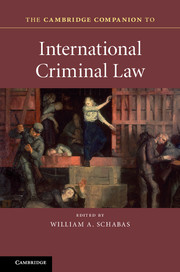Book contents
- Frontmatter
- Dedication
- Contents
- List of contributors
- List of abbreviations
- Introduction
- PART I PURPOSES AND PRINCIPLES
- 1 Human rights and international criminal law
- 2 Truth and justice in atrocity trials
- 3 Transitional justice
- 4 Punishment and sentencing
- 5 Peace
- PART II INSTITUTIONS
- PART III CRIMES
- PART IV TRIALS
- PART V THE FUTURE
- Index
- References
3 - Transitional justice
from PART I - PURPOSES AND PRINCIPLES
Published online by Cambridge University Press: 05 December 2015
- Frontmatter
- Dedication
- Contents
- List of contributors
- List of abbreviations
- Introduction
- PART I PURPOSES AND PRINCIPLES
- 1 Human rights and international criminal law
- 2 Truth and justice in atrocity trials
- 3 Transitional justice
- 4 Punishment and sentencing
- 5 Peace
- PART II INSTITUTIONS
- PART III CRIMES
- PART IV TRIALS
- PART V THE FUTURE
- Index
- References
Summary
Any volume on international criminal law would be incomplete without paying closer attention to the broader legal, political, and societal context within which this body of law is originating, as well as operating. Specifically, when countries are transitioning from violent conflict and war to the end of hostilities and peace, or when dictatorships are replaced by new forms of democracy, international criminal law becomes part of a larger agenda on how to address the crimes committed in the past or by a previous regime. More than ever before, the new power holders who may be democratically elected cannot avoid confronting the legacy of the country's past and the road towards the future. The latter half of the twentieth century and the first fifteen years of the new millennium are full of examples of such conflicts and the ensuing issues, including the Second World War, the restoration of democracy in Latin America, the period following the fall of the Berlin wall, post-apartheid South Africa, etc. Frequently posed questions include: how to deal with the offenders of serious crimes in the past, whether it is better to remember or forget the horrors of the past, how to address the damage done to victims, and what is the room for independent decision-making by countries and regimes?
These issues, and the circumstances leading to them, are nowadays subsumed under the general concept of ‘transitional justice’, which has rapidly become entrenched in national and international research and policy-making. In this contribution, we first explain the origins and content of this notion, before going into the four main components considered to constitute transitional justice. We finish with some critiques and challenges for transitional justice.
Transitional justice: what's in a name?
The International Centre on Transitional Justice, one of the world's leading think tanks in this field, defines transitional justice as ‘the set of judicial and non-judicial measures that have been implemented by different countries in order to redress the legacies of massive human rights abuses. These measures include criminal prosecutions, truth commissions, reparations programmes, and various kinds of institutional reforms.’ While this definition refers to the current-day understanding of transitional justice, it should be noted that over the last quarter century considerable evolutions have taken place at the conceptual and also practical level.
- Type
- Chapter
- Information
- The Cambridge Companion to International Criminal Law , pp. 52 - 72Publisher: Cambridge University PressPrint publication year: 2016
References
- 2
- Cited by

